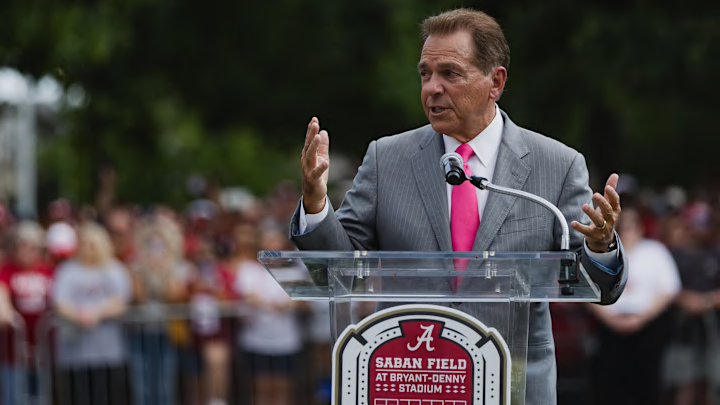Nick Saban to Talk NIL at Congressional Black Caucus Foundation

Nick Saban has not gone into coaching retirement quietly. After ending his incredible tenure at Alabama, the seven-time national champion coach quickly, and unsurprisingly, became a fan favorite as a newly minted analyst on ESPN’s flagship College Football Gameday program.
While Saban fits into his new analyst role well, he has taken up a second line of work behind the scenes, becoming an advocate for NIL reform.
This Thursday, Coach Saban will speak at the annual legislative meeting of the Congressional Black Caucus Foundation to share his concerns regarding the current landscape of college sports and highlight the need for federal congressional intervention.
Saban has long criticized the lack of regulation within the NIL system in collegiate sports. While Saban is not opposed to athletes engaging in some form of revenue sharing with their respective universities, he is not fond of the “pay-for-play” system that the universal adoption of NIL Collectives has created.
In past expert testimony at a Congressional hearing, Saban stated, “It’s whoever wants to pay the most money, raise the most money, buy the most players is going to have the best opportunity to win. And I don’t think that’s the spirit of college athletics, and I don’t think it’s ever been the spirit of what we want college athletics to be.”
Nick Saban said on Capitol Hill today he retired to a large degree because of NIL and all players care about now is getting paid. pic.twitter.com/XUaUkOmWBO
— Clay Travis (@ClayTravis) March 12, 2024
Saban shares the same concerns as many fans and industry experts, saying that success in collegiate sports will soon be more about resources than talented recruitment and scouting practices: “You’re going to create a caste system where the rich will get richer and the poor get poorer, and eventually the fans will look at it like, ‘I really don’t want to watch the game.’”
This point can be heavily debated… and even contradicted by recent statements from Saban regarding Ohio State’s robust NIL war chest: "You guys keep talking about a $20 million roster; if you don't pay the right guys, you'll be s*** out of luck."
American sporting fans have become accustomed to the socialistic nature of professional sports leagues that continually aim to promote equity within their leagues through draft positioning, revenue-sharing agreements, and salary caps – all things legally afforded to professional sports leagues because of athlete unionization, something Saban is not particularly fond of.
Saban now calls upon Congress to give college football an antitrust exemption without athlete unionization, allowing the NCAA to have its cake and eat it too.
Representative Terri Sewell, a Democrat from Alabama’s 7th District, will appropriately host the panel. Joining Saban in the presentation is South Western Athletic Conference (SWAC) commissioner Charles McClelland. The SWAC is comprised of southern HBCUs that compete in the FCS designation of NCAA Division I football. Conferences in the FCS, like the SWAC, make a fraction of the revenue FBS programs make, nearly always operating at a loss.
Saban has an in-depth knowledge of the changing recruiting dynamics in the NIL world at the FBS level. McClelland can speak firsthand to the challenges of athlete retention and expanded operational costs the new college sports ecosystem has brought to HBCU institutions and, more broadly, non-powerhouse FBS universities. Together, their experiences can paint a grim picture of the future of college sports and ignite more expediency in creating a sustainable path forward for collegiate sports.
With the House v. NCAA settlement proposal appearing to have reached an impasse after the judge presiding over the case denied the initial draft, collegiate sports stakeholders are looking for new avenues to create a sustainable path forward.
Federal congressional intervention, as Saban is pushing for, seems to be one of the best bets for enshrining protections that can shield the NCAA from the barrage of legal challenges to their authority as the regulators of collegiate sports.
